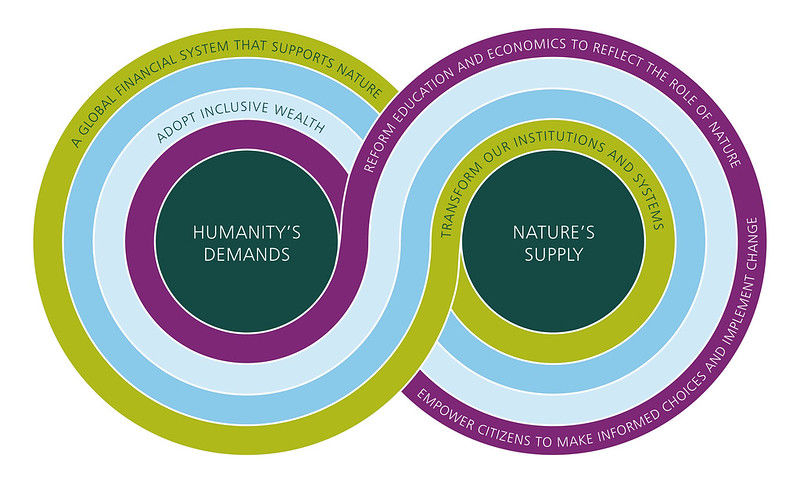News
The Dasgupta Review: we are all managers of nature’s assets

News | Feb 2021
An interview with James Vause, Lead Economist, UN Environment Programme World Conservation Monitoring Centre
How were you involved in the Dasgupta Review?
I was really lucky to have the opportunity to work with the Dasgupta Review team in the UK Treasury quite a bit. I previously worked in the UK Government on the Economics of Biodiversity, so I was invited to run some early discussion sessions with the Review team covering the TEEB Initiative (The Economics of Ecosystems and Biodiversity) – which was launched whilst I was working in Defra – and also on Biodiversity and Trade, connected to the ongoing TRADE Hub project here at UNEP-WCMC.
Through the TRADE hub, I was also given the chance to contribute a paper to the Dasgupta Review, which ended up being adapted into a full chapter (Chapter 15 on Trade and the Biosphere).
Why do you think this Review is particularly important? What’s new about it?
For me, what is special about the Dasgupta Review is its holistic nature. From the outset, the Review is clear that the economics of biodiversity is effectively the economics of the entire biosphere in which societies and economies exist. It shows how the current economic paradigm neglects the fact that economies are bounded by nature, as a result of which we are dramatically mismanaging our economies.
In this context, the review identifies the need to act broadly, including investments to accelerate the demographic transition, changing behaviours and norms around consumption and production, and restoring ecosystems to close the gap between humanity’s demands on nature and its capacity to regenerate.
The review also identifies the broad changes needed to enable these actions, from education to how we measure economic progress, finance, to ensuring we have the right institutions to manage global public goods. We all have a role to play; our collective choices and demands drive what the public and private sector strive to provide. Looking forward, the review recognises that an education system at all levels that reconnects people to nature is key to sustaining changes for generations to come.
Finally - and importantly - the review does not shy away from the scale of the challenge that we face in changing the path of the global economy. It finds that the levels of ambition, coordination and political will required to deliver the transformative changes needed are similar to or greater than those which delivered the Marshall Plan to reconstruct Western Europe after the Second World War.
The real test for policy is whether it drives action. What difference do you think the Dasgupta Review could make?
The publication is well-timed from an international perspective. There’s a busy year ahead for international policy processes, including with the Convention on Biological Diversity Conference of the Parties, which will agree the new international framework for biodiversity, the Climate Conference of the Parties, one of the campaign themes for which is nature, and the UN Secretary General’s Food Systems Summit.
It is also very significant that the Dasgupta Review was commissioned by a Ministry of Finance primarily for economic and finance policy and decision-makers to help them understand ramifications global biodiversity loss for economic prosperity. As such, the Review offers the real potential to bring biodiversity into focus at the centre of governments, as well as in the mainstream economics academic community.
This could be a big step in empowering decision-makers to both agree ambitious international goals and have the support to implement them domestically across the whole of government.
Now that the Review is published, what are the next steps?
In the UK, the formal next step is likely to be an official response to the Review from the UK government. However, the Review is likely to have resonance around the world, both inside and outside government, and so there will be a wide range of responses from bodies with a variety of different roles and responsibilities.
The full review is 600 pages long (although there is also an abridged version and a summary document that are shorter reads…), so there is a lot to absorb, but it presents clear opportunities for change across:
- Conserving and restoring ecosystems,
- Delivering a sustainable ecological footprint,
- Improving how we measure economic progress,
- Transforming our institutions and systems,
- Improving the global financial system,
- Reconnecting with nature through empowered citizenship, education and reflecting on nature’s intrinsic worth.
The review highlights that we are all managers of nature’s assets whether as individuals, businesses, governments or international organisations, through the choices we make – the products we buy and how we invest our savings. We all influence incentives to protect and restore nature or not, so one thing I will be doing is revisiting at my pension plan and banking choices. We can all make a difference and need to act now
Have a query?
Contact us
communications@unep-wcmc.org
